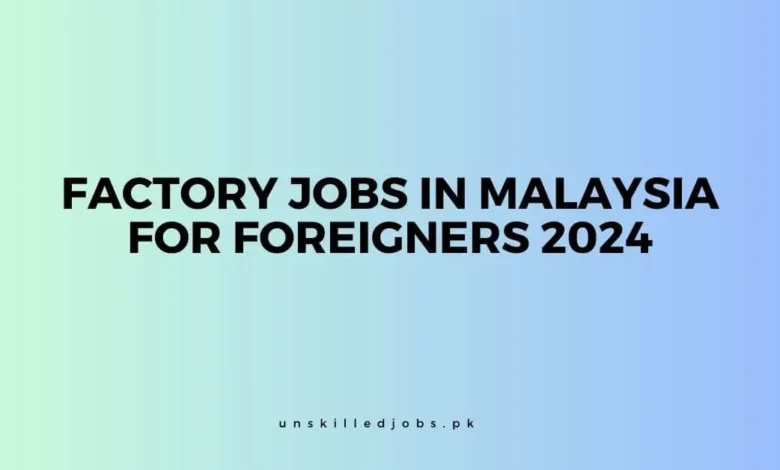Factory Jobs In Malaysia For Foreigners 2024 – Apply Now

Malaysia’s thriving industrial scene has a lot of job options for foreigners who want to work in factories and enjoy their work. The country is still looking for talented people from other countries to join its production sector, which is doing very well. Find out about the different kinds of factory jobs that are out there and start a satisfying journey toward personal and professional growth.
Introduction
Because Malaysia’s job market is so active, plant jobs have become a popular choice for foreigners looking for work. There is a lot of growth in the manufacturing sector, which gives expats a lot of options. Let’s talk about the specifics of plant jobs in Malaysia for outsiders in the year 2024.
Current Scenario of Factory Jobs in Malaysia
In Malaysia, the need for factory work has been steadily growing over the past few years. A big part of the country’s economic growth has been the industry sector, which has created a lot of jobs. This rise is because of the growth of businesses like electronics, textiles, and car manufacturing.
Details of Factory Jobs In Malaysia For Foreigners
In Malaysia, factory jobs cover a wide range of tasks in many different fields, such as electronics, cars, textiles, and more. Here are some common positions:
- Production Operator: As a production operator, your job is to run machines, work on an assembly line, and ensure the quality of the goods you make.
- Quality Control Inspector: Check goods to make sure they meet quality standards and requirements.
- Warehouse Assistant: As a warehouse assistant, your job is to keep track of inventory, handle stock, and help the flow of materials through the factory.
- Machine Operator: Machine operators run and take care of specialized machines used in industrial processes.
Benefits of Factory Jobs In Malaysia
- Employment Opportunities: Malaysia’s manufacturing sector is robust, offering a plethora of employment opportunities in a variety of industries, including electronics, automotive, textiles, and food processing. This contributes to the reduction of unemployment rates and the provision of consistent income for a significant number of individuals.
- Skill Development: Factory jobs frequently provide on-the-job training, which allows employees to enhance their existing skills and acquire new ones. This encompasses technical abilities that pertain to the operation of apparatus, quality control, and production processes.
- Career Advancement: Numerous factories offer distinct career paths that enable employees to progress to supervisory or managerial positions as they accumulate experience. This may result in increased compensation and additional obligations.
- Economic Stability: Malaysia’s GDP is substantially influenced by the manufacturing sector. Factory employment contributes to the country’s economic stability and the preservation of consistent economic growth.
- Competitive Salaries and Benefits: Although entry-level factory jobs may provide modest wages, experienced workers and those in specialized roles frequently receive competitive salaries. Furthermore, numerous factories offer retirement plans, health insurance, and paid leave.
- Workforce Diversity: Malaysia’s manufacturing sector employs a diverse workforce, which includes both local and foreign laborers. This multiplicity has the potential to establish a multicultural and dynamic work environment.
- Employment Opportunities for Unskilled and Semi-Skilled Workers: Factory roles are available to unskilled and semi-skilled workers, providing employment opportunities to those who may not have specialized training or higher education.
- Opportunities for Learning and Growth: Factory workers frequently have the chance to familiarize themselves with the most recent manufacturing technologies and processes, thereby ensuring that they are informed about industry developments.
- Economic Development: The economic development of regions where factories are situated is influenced by the employment opportunities that factories provide. This encompasses the enhancement of living standards, the expansion of local business activities, and the development of infrastructure.
- Government Support: The Malaysian government frequently offers incentives and assistance to the manufacturing sector, such as tax exemptions and grants. This assistance is instrumental in maintaining the sector’s vitality and the provision of employment opportunities.
Read Also: Permanent Mushroom Picker Jobs in Australia Visa Sponsorship
Who Can Apply
Factory jobs in Malaysia are open to people from a wide range of school and work backgrounds. Specific qualifications depend on the job and the industry, but many roles don’t require advanced degrees, so people with a range of skills can apply.
Average Salary
How much you get paid for factory jobs in Malaysia depends on the type of work, the business, and your level of skill. People can usually expect hourly or monthly pay that is competitive and often higher than the minimum wage.
How to Apply
Conclusion:
In 2024, foreigners looking for factory jobs in Malaysia’s industry sector will have a lot of options. With good pay, help with getting a visa, training programs, and a diverse workplace, these jobs offer a way to grow professionally and personally. Check out the different job openings and start a rewarding journey in Malaysia’s booming business world.
Frequently Asked Questions:
-
What are some of the most common factory jobs in Malaysia?
Common factory jobs in Malaysia include Production Operator, Quality Control Inspector, Warehouse Assistant, and Machine Operator, covering various industries such as electronics, automotive, and textiles.
-
Do factory jobs in Malaysia require advanced degrees?
While specific qualifications vary, many factory jobs in Malaysia do not require advanced degrees. These opportunities are accessible to individuals with diverse skills and backgrounds.





